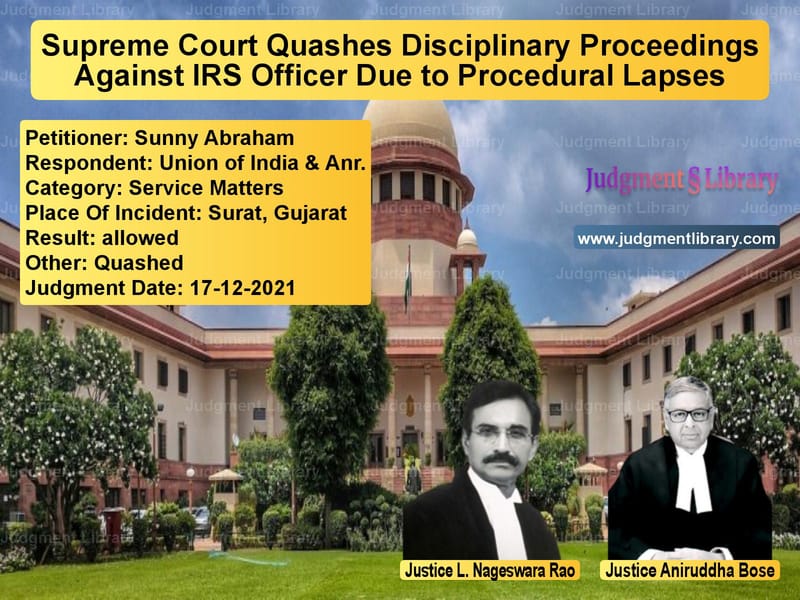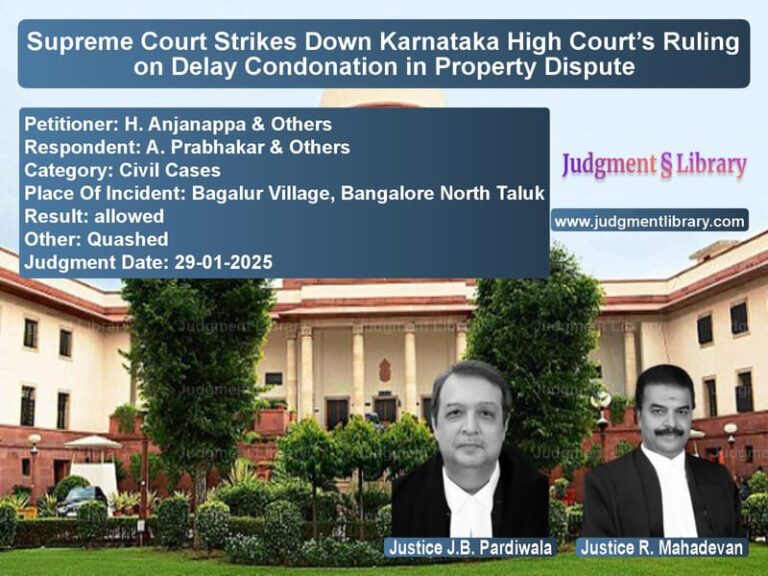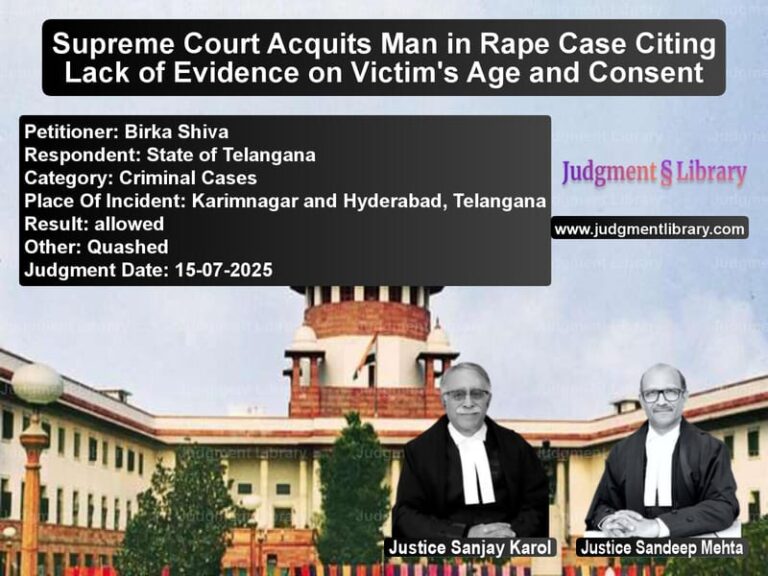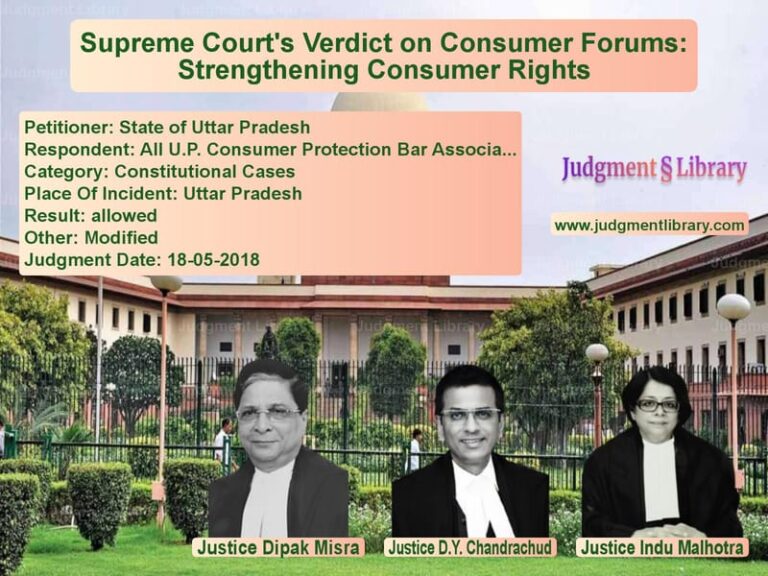Supreme Court Quashes Disciplinary Proceedings Against IRS Officer Due to Procedural Lapses
The Supreme Court of India delivered a significant ruling in the case of Sunny Abraham v. Union of India & Anr., addressing procedural lapses in disciplinary proceedings against an IRS officer accused of misconduct. The case revolved around the alleged failure of the disciplinary authority to approve the charge memorandum before initiating proceedings. The Court set aside the Delhi High Court’s ruling and quashed the proceedings, reaffirming that fundamental procedural requirements cannot be circumvented.
Background of the Case
The appellant, Sunny Abraham, was an Assistant Commissioner of Income Tax at the time of the alleged incident in 1998. The charges against him included collusion with a Deputy Commissioner of Income Tax in demanding an illegal sum of ₹5,00,000 from a taxpayer during a survey conducted under Section 133A of the Income Tax Act, 1961. The authorities initiated disciplinary proceedings against Abraham under Rule 14 of the Central Civil Services (Classification, Control, and Appeal) Rules, 1965.
The disciplinary proceedings commenced with an approval by the Finance Minister on 19 September 2002. However, the actual charge memorandum was issued on 18 November 2002 without obtaining specific approval from the Finance Minister. This procedural defect became the crux of the legal challenge raised by the appellant.
Abraham challenged the charge memorandum at multiple forums, including the Central Administrative Tribunal (CAT) and the High Court. His key contention was that the absence of prior approval by the disciplinary authority rendered the charge memorandum invalid.
Arguments by the Appellant (Sunny Abraham)
The appellant, through his counsel, presented the following arguments:
- The charge memorandum dated 18 November 2002 was issued without the required approval of the disciplinary authority, violating Rule 14 of the CCS (CCA) Rules, 1965.
- The Supreme Court’s ruling in Union of India v. B.V. Gopinath (2014) 1 SCC 351 held that charge memoranda issued without prior approval from the competent authority are non est (legally void).
- The disciplinary authority’s subsequent attempt to issue an ex-post facto approval in 2014 could not cure the fundamental defect in the charge memorandum.
- Since the entire disciplinary proceeding was based on an invalid charge memorandum, it should be quashed.
Arguments by the Respondents (Union of India)
The Union of India, through its counsel, defended the disciplinary proceedings with the following arguments:
- The initial decision to initiate disciplinary proceedings was approved by the Finance Minister on 19 September 2002.
- The absence of explicit approval for the charge memorandum was a curable procedural defect and did not vitiate the entire process.
- The department rectified the issue by securing the Finance Minister’s ex-post facto approval in 2014.
- Given the serious nature of allegations against the appellant, the Court should allow the disciplinary proceedings to continue.
Supreme Court’s Observations and Judgment
The Supreme Court analyzed the case in light of its previous ruling in B.V. Gopinath and concluded that:
- Under Rule 14 of the CCS (CCA) Rules, 1965, a charge memorandum must be approved by the disciplinary authority before issuance.
- In B.V. Gopinath, the Court held that charge memoranda issued without such approval are non est (void from inception) and cannot be subsequently ratified.
- The absence of prior approval in the appellant’s case constituted a fundamental procedural lapse that could not be cured retrospectively.
- The issuance of ex-post facto approval in 2014 was legally ineffective in validating the flawed charge memorandum.
- Administrative convenience or the seriousness of allegations cannot override mandatory procedural safeguards.
The Court stated:
“What is non-existent in the eye of the law cannot be revived retrospectively. Life cannot be breathed into a stillborn charge memorandum.”
Accordingly, the Court quashed the disciplinary proceedings, allowing the appeal in favor of the appellant.
Key Legal Precedents Considered
- Union of India v. B.V. Gopinath (2014) 1 SCC 351 – Held that a charge memorandum issued without approval from the competent authority is non est and cannot be ratified subsequently.
- State of Tamil Nadu v. Promod Kumar, IPS (2018) 17 SCC 677 – Affirmed that procedural irregularities in disciplinary proceedings cannot be ignored.
- Ashok Kumar Das v. University of Burdwan (2010) 3 SCC 616 – Distinguished between prior approval and ex-post facto approval in administrative matters.
Final Verdict
The Supreme Court set aside the High Court’s judgment and restored the order of the Central Administrative Tribunal, which had quashed the charge memorandum against the appellant. The Court, however, granted liberty to the department to initiate fresh disciplinary proceedings within two months if deemed necessary.
This judgment reinforces the importance of procedural integrity in disciplinary proceedings and ensures that government officials are not subjected to arbitrary actions based on defective charge memoranda.
Petitioner Name: Sunny Abraham.Respondent Name: Union of India & Anr..Judgment By: Justice L. Nageswara Rao, Justice Aniruddha Bose.Place Of Incident: Surat, Gujarat.Judgment Date: 17-12-2021.
Don’t miss out on the full details! Download the complete judgment in PDF format below and gain valuable insights instantly!
Download Judgment: sunny-abraham-vs-union-of-india-&-anr-supreme-court-of-india-judgment-dated-17-12-2021.pdf
Directly Download Judgment: Directly download this Judgment
See all petitions in Disciplinary Proceedings
See all petitions in Public Sector Employees
See all petitions in Judgment by L. Nageswara Rao
See all petitions in Judgment by Aniruddha Bose
See all petitions in allowed
See all petitions in Quashed
See all petitions in supreme court of India judgments December 2021
See all petitions in 2021 judgments
See all posts in Service Matters Category
See all allowed petitions in Service Matters Category
See all Dismissed petitions in Service Matters Category
See all partially allowed petitions in Service Matters Category







